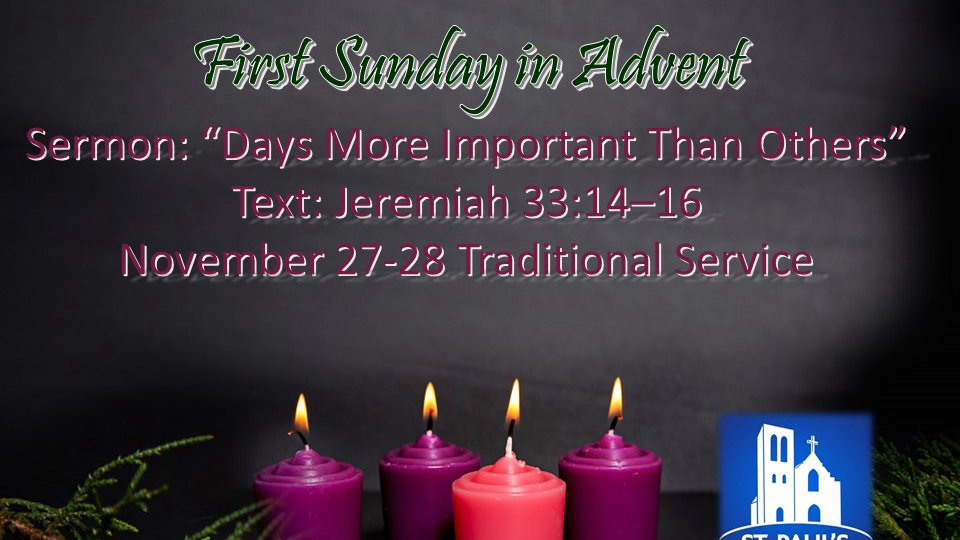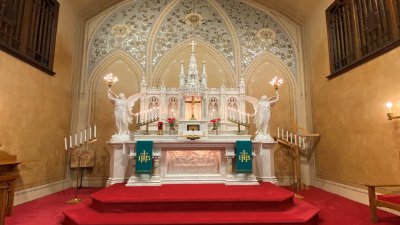Some days in our lives stand out as more memorable than others. The birth of a child, a long-awaited graduation, a particular vacation, or a family gathering are all days of joy that become part of the stories of our lives. A terrible illness, the death of someone dear, the loss of a job—these days, too, stand out as moments seared in our memories of pain that never seems to go away entirely. Some days stand out more than others. Today’s Readings declare the days when Jesus came into the midst of all our joys and sorrows to bring joy, restoration, and hope. Our salvation was won on Good Friday and Easter Sunday. And the day is still coming when Christ will return and all creation will be restored. Jesus fills our days—good or bad, joyful or sorrowful—with His gracious presence from now until He returns on that great Last Day.

11/28/21 Traditional Service
Sermon: “Days More Important Than Others” Text: Jeremiah 33:14–16
November 28, 2021
04/14/24 Praise Service
April 14, 2024
AS WE GATHER “Amazing” is a commonly used word in the English that has a rich history. It came into common usage in the 14th century as a variant of the older root word “amasod,” which meant stupefied or confounded or overwhelmed with sudden surprise or wonder. The word “amazing” shows up several times in hymns that we sing—from describing the action of God in the birth of Jesus as “love amazing” (LSB 375:1) to bringing to our hearts and minds that in His suffering to pay the price of our sins, our Lord showed “amazing pity” (LSB 437:2). Two other hymns refer to the “amazing grace” of God (LSB 744:1; 558:2), and in another hymn, the author of the text rejoices that God “has done amazing things to me” (LSB 934:2). The season of Easter is a time for us to be truly amazed and filled with the praise of our amazing Lord!
04/14/24 traditional Service
April 14, 2024
AS WE GATHER “Amazing” is a commonly used word in the English that has a rich history. It came into common usage in the 14th century as a variant of the older root word “amasod,” which meant stupefied or confounded or overwhelmed with sudden surprise or wonder. The word “amazing” shows up several times in hymns that we sing—from describing the action of God in the birth of Jesus as “love amazing” (LSB 375:1) to bringing to our hearts and minds that in His suffering to pay the price of our sins, our Lord showed “amazing pity” (LSB 437:2). Two other hymns refer to the “amazing grace” of God (LSB 744:1; 558:2), and in another hymn, the author of the text rejoices that God “has done amazing things to me” (LSB 934:2). The season of Easter is a time for us to be truly amazed and filled with the praise of our amazing Lord!
04/07/24 Traditional Service
April 7, 2024
AS WE GATHER When Thomas finally met Jesus, alive again after Easter, he went from demanding proof to a personal confession of faith, “My Lord and my God.” It would have been a different story had the news been false. The rest of the Jerusalem congregation truly exhibited Easter faith when they became a welcoming community, one that shared with newcomers whatever they needed. The news was unbelievable, but so were the responses—in word and deed as faith saw the freeing truth: we need fear nothing, not even death. We have heard the news as well. How shall we respond?





